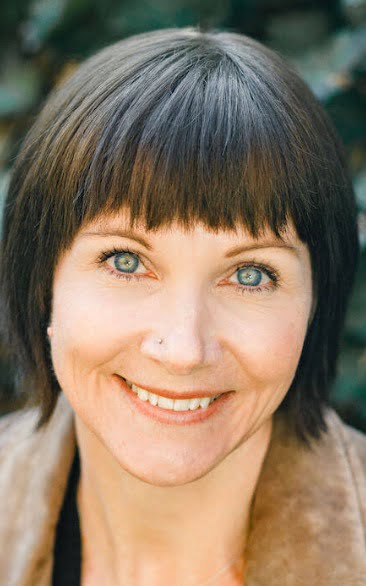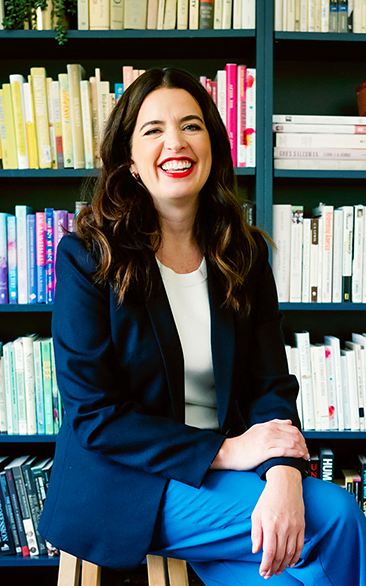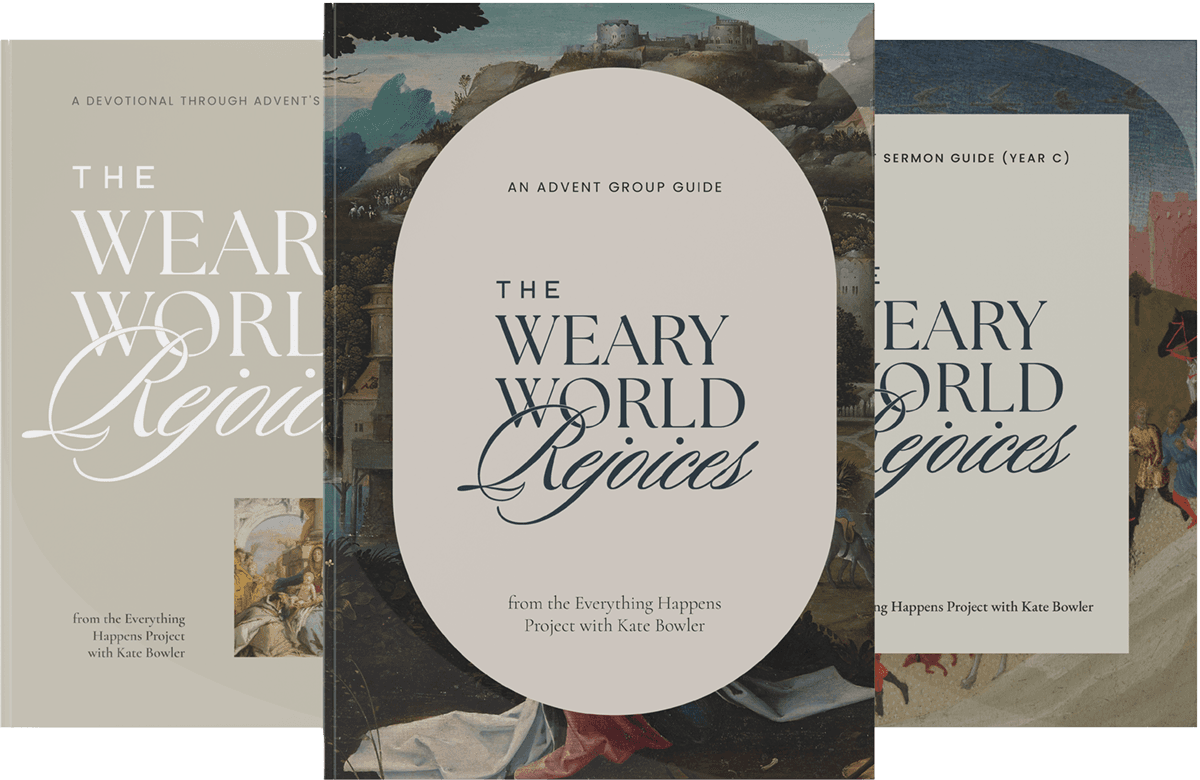Kate Bowler: Hello, my dears. Before I begin today’s conversation, I wanted to let you know about a new book that’s coming out. And it’s from my lovely friend and former podcast guest, Gretchen Rubin. Gretchen wrote a gorgeous book about savoring the life that’s right in front of us. It’s called Life in Five Senses: How Exploring the Senses Got Me Out of My Head and into the World. And oh my gosh, yes. Don’t we just all need that reminder? Gretchen is, she’s like, such an explorer. She wanted to look at the mysteries and joys of the five senses as a way to experience more happiness. Which always makes me think of that line from Thoreau: “I want to live deep and suck out all the marrow of life.” It’s everything from the simple pleasures of experiencing the magic of ketchup, which I think we all know that I love. I don’t know why I say that like I’m the first person who’s loved ketchup. But truly, it was just so great. It was also at our podcast episode where she’s explaining to me how ketchup has all the magical things like umami. So she looks at, I don’t know, the beauty of food to curating a playlist, to going to an art museum every day. Gretchen shows us how to live awake to each day with depth and delight and connection. So I think you’re really going to love it. It’s called Life in the Five Senses. And it’s available now wherever books are sold
Kate: You know that feeling where we imagine our lives along a simple trajectory that we can follow? It’s kind of like in the game of life. We’re like, this is the part where you graduate college. This is the part where you get married. This is the part where you choose your career and buy your split-level home. This is the part when you have two healthy, successful children. This is the part where you retire at the millionaire estates. Ding, ding, ding. You’ve won the game of life! But more often than not, our lives don’t follow a trajectory. So how do we make sense of lives that veer from our expectations, from our plans? What might happen next? And then who do we become? Can that be beautiful still? Today I’m talking to a careful observer of the human condition. And her name is Maggie Smith. Maggie is a poet and the author of award-winning books of poetry like Goldenrod and Keep Moving. You’ve probably heard her viral poem “Good Bones,” which has inspired basically everyone with a pulse. Maggie’s life was on a certain trajectory. She had a loving husband that she’d been with since college. Two funny kid, they’re living in the city of her childhood, like right near the family. Dance-parties-after-dinner sort of happiness. That is, until she discovered her husband may have been unfaithful. Her new memoir, You Could Make This Place Beautiful, chronicles the aftermath of a painful, unexpected divorce and the end of a life that she thought that they would have together. Maggie, I have been looking forward to this like a little homecoming. So thank you so much for doing this with me today. It just makes my heart feel so full.
Maggie Smith: Oh, my gosh. I love that. And I have to say, that’s sort of how I have been framing this book to myself. That’s sort of been like a key word in my mind is “homecoming.” So I love that.
Kate: I guess maybe then we could start with the part where we feel exiled from the story of our choosing. We want to believe that we have all kinds of like life-as-a-series-of-choices control. And then most of what happens in our lives happens to us. So your story, like a lot of lovely people in this community, is one with a very crisp dividing line of before and after. I wondered if we could maybe start with what your life was like in the “before time.”
Maggie: Yeah, it’s funny, I think the before times felt very secure to me and sort of planned out. And as a type-A, firstborn daughter with a very sort of stolid Midwestern upbringing, I was like, “Oh, this is what you do, right?” You do this and then you do this and then you do this and okay, no, all those balls are in the air. I’m sure I can add another one into the mix and then another one and oh, look, they’re still in the air. So I must be, “doing it right.” And so my life, you know, in the before times was I was a writer, I was a wife. Eventually I was the mother and the mother of two children, a daughter and a son. So, you know, my life is a lot of caregiving. And then less writing than caregiving, I would say, you know? I probably parent more hours out of the day than I than I do creative work. But parenting is creative too, I suppose. So that was really the before and then the after. It’s strange when I think about it, because most of those things are still the same. And it’s actually really useful to think about that. Like, it’s I think it’s easy when life takes a big turn to be like, “Wow, I don’t even recognize my life anymore. I thought it was one thing and now it’s something else.” But if I really move through the list of things I just gave you about my before life, the only thing missing is the spouse. I’m still doing the same work. I’m still parenting the same kids. I’m still living in the same house. So there’s actually a lot of continuity for as bewildering as that shift was.
Kate: Yeah, yeah. I imagine that the total disorientation is … is it the undoing of the story? Like you’re like, “I had the thing that I told people at parties. I’m Maggie. This is my husband. This is my life.”
Maggie: Yeah. I mean, we met in college and we were in our early twenties, and then we built this life and will, you know, be together when we’re old, just like I expect my parents to be. Although, I suppose in some ways they are, because they’re in their seventies now, but to me they’re still like 45, which is weird because I’m 45. So how are my parents my age? No one tell me. I don’t want to do the math. Yeah. I mean, I think to me it was a beautiful story. You know, you meet someone, you both love books and writing and film and music, and you build a life that is sort of an artistic life, but also a domestic life. And to me, that’s what the story was. And so the story after that was like. But then … it wasn’t quite what I thought. And how do we, you know, how do we sort of recover from that, really, without having all of the answers to why the thing didn’t work? And so in some ways now, things feel more authentic to me in my daily life. I don’t feel like I’m auditioning for something anymore.
Kate: Yes!
Maggie: Every day.
Kate: When’s that role gonna happen, right? When will they call?
Maggie: Yeah. What will they call? They’re not going to call. This is just it. Yeah. And and yet it is, you know, the the sort of cognitive dissonance of it all is still something that I struggle with a lot.
Kate: I don’t know how to ask this question because I feel like we could do the gross version and then the poetic version of it, because the gross version is like, “Maggie, what happened?” And you write so beautifully about what do people mean when they ask that? Like, what terrible, awful diagnostic thing do they want to know? One guesses, too, when people ask me, “What happened?” Well, you know, one version of that is … they want to know if whatever happened to me is going to happen to them.
Maggie: Yes, I think it’s avoidance. I think there’s something about like, oh, can I not do whatever you did?
Kate: Yes. Tell me now
Maggie: Yeah. Like, okay, lay it out. Lay it out for me and then reverse-engineer it. So wherever you made that happen to you …
Kate: It’s a reverse prescription.
Maggie: Right? I cannot have that happen to me. And I do think it’s a need for comfort and control and solace that, like, these bad things that happen to somebody else won’t happen to me because, oh, look, I know the details now, and they’re not like my details or that doesn’t look like my life.
Kate: Yes.
Maggie: And I think there’s something to that. But I mean, I also think the bottom line is anything can happen to any of us at any time, which no one wants to hear. So I’m sorry. I just had to say that out loud.
Kate: Doesn’t it feel so…? I always feel when I say something like that, for which I just love you, I’m wearing like an enormous placard that reads “the end is near.” You bring people right up to the edge of like, wow, no one’s driving this boat necessarily.
Maggie: Yeah, Yeah. And that’s unnerving. And so I think some of our some of our craving for detail is we want to be able to sort of like process something and set it aside and not have to live with it. You know, precarity is tough, like when we have to live with it with ourselves and with other people. And so, I mean, the sort of short answer to what happened is: I don’t really know. And the sort of longer answer is: Lots of different things happened. I mean, I don’t actually ever sort of figure out what the magic recipe of what we could have endured in our marriage was. I just know we went over the threshold of that.
Kate: Yes. Threshold is such a nice word. Yeah. There’s such a desire to rewind the tape and just kind of know exactly which detail like … I saw the sign for this. I could have gone to counseling. I guess it’s the tape of “could have’s.” The mixtape called “could have’s.”
Maggie: Yeah
Kate: Or for health stuff. I could have made that doctor’s appointment. I could have believed myself in a certain way. Or I could have checked in on that friend and then we’re never given the luxury of that delicious, omniscient feeling that we want so much.
Maggie: Yeah, the “could have’s” are hard.
Kate: You quote this lovely bit by Zora Neale Hurston. It says, “There are years that ask questions and years that answer.” And I thought that was such a beautiful encapsulation of, like the desire you have, we have, to make the coherent story, to be able to tell it backwards and forwards. And then trying very hard to let go of having that omniscient feeling
Maggie: Yeah. I mean, in some ways there are years that question and then years that question harder, right? Or years that answer in sort of oblique ways. And I really I find myself craving answers to all these questions and and some of them I can’t have. And I think that’s something that we need to to live with. And when I’m writing a poem, what I do is really think about the container and sort of like, what’s the experience I’m trying to enact or embody in this poem and what is the shape that is going to do the best job at enacting or embodying that feeling? And sometimes it’s couplets because I love a lot of white space to kind of spread something out, you know, let the reader take their time. Sometimes it’s like a prose poem that’s like this really imposing blocky chunk of text, because I want you to just get in there and have no relief and not be able to get out, like just get in there and have the experience. And in writing this book, I realized that really what the last few years have felt like to me was pretty fragmented. I mean, piece-iness and fragmentation and repetition and sort of looping and lyricism and this book. And that for me was like the best way I could sort of access the answers was via form. And that’s the poet in me.
Kate: Yeah. Oh, lovely. You have this gorgeous image too of our lives like nesting dolls. Like those little matryoshkas. I thought it was such a beautiful way for people whom may have a lot of chapters in their life, and they’re not really sure that actually, the chapters make a story.
Maggie: Yeah, I mean, in some ways it’s sort of a foil idea or like a pushing back against the idea of progress or evolution is the idea that like inside 45-year-old me is 43-year-old me and 13-year- old me and seven-year-old me and all of these previous sort of versions or iterations of myself are all contained inside me. Another way of thinking about it is like “saving over” something, you know, like when you write a new version of something and you save over it and replace it. I don’t do that. When I’m writing, I save version two, version three, version four, because I always want to be able to go back and see what was going on in that initial draft. And so I don’t think of us as being saved over. I think of us as being saved alongside. And so the sort of nesting doll metaphor is really about sort of carrying all of ourselves, all of those memories, all of those experiences along with us. And then relationships too, I think, are nested. Inside the current relationship are all of the previous iterations of that relationship, whether it’s with your spouse or your kids or your parents, you know, all of these things kind of evolve and change, but you still keep all of those versions as you age
Kate: I like that. That’s a nice addition too to the before-and-after framework because sometimes that can feel really… I mean, in my own terrible experience, that fault line sort of also really created a desire to go back to that seamless feeling I had before when I was sort of dumb and confident and hadn’t hit every branch on the way down. And so I kind of like the “nesting doll” feeling, which, in that version, was the one who didn’t have a great time in college. And the one before that was who made some lovely high school friends and learned a lot about love through friendship. And then. And then. And then. It’s kind of a lovely feeling.
Maggie: Yeah. And they all get to come along. I mean, I think that’s part of the thing for me is a before and after makes me nervous. First of all, I almost always prefer the before picture in any comparison. Like anytime somebody like re-does their living room or gets a haircut, I’m always toggling back and forth and I’m not quite clear on which one is before and after, because I usually prefer whatever was going on in the before photo, which I’m sure says something about me that’s got to be like a Myers-Briggs or Enneagram thing. But I mean, “after” … that makes me nervous. I think there’s like a sort of like false neatness to that idea of like before it was like this and now, you know, before I was a caterpillar and now I’m a butterfly. It’s like, well, maybe I was a butterfly before. I’m just a different kind of butterfly. Or maybe I’m still in a pupa. But the pupa is a little different. I mean, the neatness of like what we expect from not just others, but ourselves as far as like, you know, capital “T”, Transformation through these big life changes. It just puts so much pressure on us to, like, learn the big lesson and be better.
Kate: Yeah, you’re very anti-progress in a way that makes me want to hold you in my lap. Because you say so many wonderful things about that. You know, if people keep wanting to hand you lemons in order to make lemonade and they’re like, “Oh, but you added a lot of vodka” and you were like, “Oh, but the lemonade wasn’t worth the lemons.” I thought that was such a devastatingly punchy thing to say
Maggie: Coming off of Keep Moving, that was something someone said to me when I published Keep Moving, which was, “Wow, you sure made lemonades from those lemons and added vodka to it.” And I laughed. I thought it was really funny. I still think it’s funny because I get the impulse behind that statement is first congratulatory and sort of prideful and like, look, you did it, right? Like you took something terrible and made something beautiful from it. And I appreciate that. But at the same time, it wasn’t worth it. I’d rather have a smooth life and no book.
Kate: Totally. Totally. And the implication that writers are just, like, looking for horrible, horrible events in order to “metabolize.”
Maggie: No, don’t need a tote bag of trauma to pull things out of to write books, like I would have written a book that year. I would have written a book last year. I just would have been a different book, you know, And there’s material everywhere. I don’t need it to happen to me.
Kate: All the “lemons and lemonade” metaphors break down so intensely in describing mothering and your worries about your kids and I really appreciate the honesty with which people want to say things like, you know, didn’t it just make them more resilient? And you have you have a strong answer to that
Maggie: Yeah. And for what? I mean, I would rather have kids who are less resilient and feel more secure. Right. I mean, I again, I didn’t want the lemons and I didn’t want the lemonade, so. Yeah. And again, like talking about sort of material. Well, you have this material and you were able to do so much with it. Well, okay, so I wrote books, but what are my kids doing with it? They’re living with it. And maybe someday they’ll write books. I don’t know. Maybe they’ll maybe they’ll compose music from it. Maybe they’ll become distance runners fueled by it. Maybe, you know, maybe they’ll just be very kind, compassionate, do-no-harm humans because of it. But yeah, it’s not a gift. Like, no, this kind of trouble is not a gift
Kate: Yeah, it’s the implication is that, like, all pain becomes a song. It doesn’t. If we’re very lucky, we hear some of the notes. But for the most part, it just like it rings through us, like without melody.
Maggie: Yeah. Yeah, it’s a little tricky. I mean, I think there I can find gifts anywhere if I look and I do. I look hard, you know, if they’re not obvious.
Kate: Yeah.
Maggie: But there’s just there’s a lot else out there. And frankly, I’m really looking forward to, like, the next book not being about trouble.
Kate: You have this really touching story about when you had your first Christmas without your kids for the first time in your house and you thought you were going to have a certain kind of day. It’s sometimes like the loneliness, I imagine, of divorce feels very permanent. And then all of a sudden, it sounds like it wasn’t
Maggie: Yeah. I mean, I went for a run one Christmas. My kids were not in my house. I had to wait a few hours to get them back to me. And, you know, there was a knock at my door, and someone was standing there with cake. And said, “I just saw you run by my house. And I remember that this is your first Christmas without your kids on Christmas morning. And I remember having that experience the first Christmas after my divorce. So here is some cake.” And then we’re both in tears as I’m sweating in running clothes and she’s handing me cake. And then as I’m standing at my kitchen counter eating cake with my hands like a raccoon in the alley, still in my running clothes, there’s a knock at my door again and it’s another neighbor bringing me treats like, “I know this is a hard year I thought you might use.” And I just thought, you know what? I’m not alone. And I will say that. You know, as much as the book has been about me realizing I’m still me. I predated my marriage, which is important to remember, and I have outlasted it. It’s also, I think, been a real sort of like study in community and how much I have leaned on the sort of grace of other people, friends who showed up with food, people who took me to happy hour, friends who were like, “Let’s start roller skating because it’s a pandemic and we can’t go anywhere.” Whenever you’re feeling like, oh, I have made a mess of my life or my life is a mess, and then someone offers you kindness, it makes you feel worthy in a way that you might not have been feeling, you know, 5 minutes prior
Kate: Yeah. Yeah. You’ve had a friend, too, who got really into birding, and I thought the logic was so lovely. What can you tell me about that?
Maggie: Yeah, we. We were coworkers for a long time, and now she actually edits a birding magazine, and she loves birding. And we were talking one day and she was like, Oh, it’s actually the best thing because you can’t think about anything else when you’re birding. It’s so engrossing. You are just in it. You’re looking, you’re researching, you’re listening, all your senses are engaged. You are not thinking about any bad emails, snarky texts, things that like plague you when you lie in bed at night and wish you could sleep. And I love that. I love that idea. I think for me, running was was like that for me, like just being in my body instead of in my brain was really useful as someone who’s sort of treated my body like a plant stand for my head for many, many years. Like it is the thing that gets the head around and moves it places. But I’ve really ignored everything from the neck down for most of my life. And then I was like, Oh wait, we store stress in our bodies. So I can’t actually think my way beyond this feeling. My therapist (not the intuitive therapist, the other therapist, because I like to have a few), my traditional therapist is like, you thinking isn’t going to do it. You know, you really need to get the stress out of your body. And she said, Have you ever tried screaming into a pillow? And I started laughing cause I was like, Who does that? But yes, she was like throwing something, you know, screaming into a pillow, going for a run, dancing, jumping on a trampoline, like release the stress from your body. Genius
Kate: Sometimes I do it with, like, transitions from, like hot shower, cold shower, walking outside. Like, I just try to use temperature to be like…
Maggie: It’s like a hard reset, right? It’s a hard reset. Yeah. Yeah. It’s like we’re just going to get back to the factory settings on this one and see if we turn it on. You know, most things, if they’re not working correctly, if you turn them on and off, they miraculously work again. And maybe with the body, it’s somewhat like that.
Kate: That’s so good. I’m just thinking about your beautiful poem, “Good Bones.” And what a terrible deal it always feels like we’re giving our kids when we want to introduce them to the beauty and the terror of the world. Actually, Maggie, would you mind reading it for people who haven’t? Would that be all right
Maggie: Of course
Kate: I will just lightly preface it then. For people who haven’t read it, this gorgeous poem went viral. And I mean Meryl Streep reading it out loud, viral. Episode of Madame Secretary framed around it, kind of viral. And it is absolutely stunning and also the heart of your heart about what you what you want about the tragicomedy of this life. So. no, I’d love to hear.
Maggie: It is tragicomedy, isn’t it? This is “Good Bones.” Life is short, though I keep this from my children. Life is short, and I’ve shortened mine in a thousand delicious, ill-advised ways, a thousand deliciously ill-advised ways I’ll keep from my children. The world is at least fifty percent terrible, and that’s a conservative estimate, though I keep this for my children. For every bird there is a stone thrown at a bird. For every loved child, a child broken, bagged, sunk in a lake. Life is short and the world is at least half terrible. And for every kind stranger, there is one who would break you, though I keep this from my children. I am trying to sell them the world. Any decent realtor, walking you through a real shithole, chirps on about good bones: This place could be beautiful, right? You could make this place beautiful.
Kate: I love the thought that we’re simultaneously selling them and protecting them and loving them and fearing for them at the same time. And that’s somehow the strange beating heart of motherhood
Maggie: Yeah. How do you protect with honesty? You know, how do you tell without fear? I mean, that’s this balance. That’s I don’t know if I’m ever doing it right. I mean, every day I’m like, should I have said less? Should I have said more? Should I be telling them more about this thing that’s going on in our town, in this state, in this country, in the world? Should I be telling them more or less? Should I have said it differently? Should I framed it in a different way? I mean, it’s so tricky. And when I wrote the poem, they were so young, that I had the luxury of keeping things from my children. And now I no longer have that luxury. You know, Violet has a phone, and when she turns it on in the morning, she gets that little Apple news ding that tells her things I haven’t even gotten to break to her yet. Like, I don’t get to be the breaker of news anymore. That is a shift in parenting when they don’t need you as the sort of mediator between themselves and the world anymore. And so then all I can do is sort of be a soft place to land and a place to sort of listen and console and, you know, puzzle things through and commiserate and sometimes also just be mad together, you know?
Kate: Yeah. Yes. You have this beautiful image about, like the birds and the trees. You said, come on, Maggie, come on. “The thing about birds. If we knew nothing of jays or wrens or sparrows, we’d believe the trees were singing as if each tree had its own song. The thing about this life, if we knew nothing of what was missing, what has been removed, it would look full and beautiful.” I don’t think people always know what’s missing from the outside.
Maggie: Yeah. And I think it’s also a lesson in like. You know. I know what’s missing, but also, I have a really full life. You know, I know that there are things about my life that are really different than they were four or five years ago. And technically, those are absences, right? Like, those aren’t games. Those are absences. But my goodness, if you had told me 30 years ago, that I would be parenting these two miraculous people who I love so much and living in my hometown and having Sunday dinner with my parents and my sisters and my brothers-in-law and my nieces and nephews every Sunday and writing and getting to keep, you know, making books and teaching. And then you also said, but also this bad thing will happen and it’s not gonna last forever. I probably would have focused on the bad thing because that would have been me 30 years ago. But all of this stuff still is here. Like the trees are still singing. The trees are still singing.
Kate: Yeah, yeah, yeah. And your thing at the end, when you look at your kids, you’re like, but you. You make this place beautiful
Maggie: Yeah. And I wouldn’t have them otherwise. So a lot of like “yes, but” and “yes and” thinking that has to happen around this, but I wouldn’t trade them for anything, period. And for a while I was in so much pain that I really did think I would undo everything. I would eternal sunshine of spotless mind. I would like to hit reset. I would like to do a hard reset and just get to do my entire life over. I really would. And that was just pain talking. And after sitting with it long enough, I was like, no, no, I take that back. I’ll take the pain because I get this with it. I can do it
Kate: Maggie. What a gorgeous, courageous, lovely person you are. Thank you so much for getting in the weeds of the intensity of precarity. I really think you’re so lovely. And thank you so much for this conversation
Maggie: Oh my goodness. Thank you.
Kate: How do we begin living in the aftermath of our lives when the stories we’ve clung to about who we are and who we’ve been and who we’re becoming come unraveled? Maggie describes that before and after, not as a clean line because so much of who she was before she still is today. A mom, a friend, a daughter, a writer … ding ding ding … like all still true. Maybe your aftermath began in the wake of a divorce or after a family secret that came to light. Or once you got a diagnosis or after a funeral, perhaps you didn’t have that baby. The person you hoped for never arrived. And then. Tick, tick, tick, tick. That feeling of being unspooled. Life came undone. And yet. We could make this place beautiful. That kind of hope-making is what we do here together, telling the full truth and hoping still that, yes, we could make this place beautiful. So if you need that feeling of your heart stretching and making a room for new hopeful things, here’s a little blessing from our new book of blessings. That book’s called The Lives We Actually Have, so you kind of get the gist of where that’s going. So here it is, a blessing for you. God, my life is too many things. Awful. Lovely. Full. And shockingly incomplete. Will you help me learn to live with a greater capacity for this? Living in the tension between a life that has worked out … and the one that has gone to hell in every handbasket. Let today be a divine exercise of yes … and. Yes, I have so much to be thankful for, and this hasn’t turned out like I thought it would. Yes, I feel moments of joy, and I have lost more than I could live without. Yes, I want to make the most of today, and my body keeps breaking. Yes, I am trying to be hopeful, and this is daunting. Yes, I am trying to be brave, and I feel so afraid. So bless me, trying to live in between those two words: yes … and. May I understand that this is where the real work of life is found. Where it takes courage to live. Where grief can strip us to the studs and love can remake us once again. Where our hearts can be both broken and keep on beating. Never sorry to have been broken at all. Yes … and. Make me capable of great joy, great love, great risk, even fear, as you expand my heart with this yes … and today. Bless you, my loves. May this be a heart-expanding week for you. See you soon
Anonymous Hi, Kate. I’m calling to share about how people best supported me through my divorce. My daughter was really, really young when I got divorced. The people who physically showed up and sat with me and remembered the person that they knew, the Madison that they knew who was a friend, a daughter, a peer, you know, instead of just this person going through a divorce. But especially when that physical presence meant that they remembered me on holidays, which ended up starting to feel really lonely, you know, when you don’t have your daughter all day on Christmas or you celebrate Mother’s Day and no one remembers to tell you Happy Mother’s Day because your child’s too young to talk. When your friends and your family speak into those moments and help you feel seen. And you know, even if it’s helping your child draw a card at preschool, those really mean a lot when the normal place at those holidays would involve other people doesn’t exist anymore.
Deb Hi, Kate. My name is Deb Snyder. So I would say for anybody that’s going through a divorce or knows somebody that’s going through a divorce, to just be there for them, listen to them and just be a support for them because that’s what they really need.
Barb from Ontario Hi, my name’s Barb. I’m from Ontario. I was in a 40-year-marriage, which ended. My husband had an affair and he was quite happy to continue with the other relationship and our relationship, which I wasn’t. So I ended the marriage and, I’m gonna get emotional. Um. One of the nicest things a friend did was invite me on their family holiday to Aruba and to just go and sit and heal by the beach and the ocean with people who loved me and cared for me was probably the nicest thing anyone’s ever done.
Ann from Colorado Hi, Kate. This is Ann from Colorado. I moved into a new home for myself and my son and was devastated at leaving the house that I had raised my children in and had planned a future that was never going to be. And my people showed up. They started ripping open boxes and unpacked my stuff. My kitchen is still a little oddly arranged five years later and I leave it that way on purpose to remember that support and love they showed. Love is a verb. Thanks.
Kate: This episode of the Everything Happens podcast was made possible because of our generous partners, Lilly Endowment, the Duke Endowment, Duke Divinity School and Leadership Education. And of course, nothing is possible without the wisdom and expertise of my absolutely fabulous team. Jessica Richie, my heart, I love you. Harriet Putman, Keith Weston, Gwen Heginbotham, Brenda Thompson, Hope Anderson, Jeb Burt, and Katherine Smith. This really is my very favorite kind of group project. So if you want to know what else we’re up to, head over to katebowler.com/newsletter so you don’t miss a thing. I would really love to hear what you thought about this episode. Would you consider leaving a review on Apple Podcasts or Spotify? It means a ton to us when we hear what you liked or who you want to hear in conversation next. Also, we really love hearing your voice. Feel free to leave us a voicemail. We might even use it on the air. So call us at 919-322-8731. All right, lovelies. I’ll talk to you next week. But in the meantime, come find me online at @katecbowler. This is Everything Happens with me, Kate Bowler.












Leave a Reply